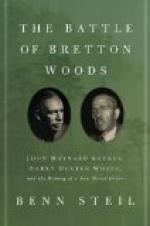“They shall sleep soundly in the hay,” said he kindly, “though it be against the law. I will risk even the bear and the wolf for the sake of that you wear about your neck. But the stable and the company of beasts are not fit for the like of you. That I know, though you be in rags. Come into the house, young stranger.”
“Have you forgotten,” said John gently, “how once a stable sheltered the greatest King of all among the humblest beasts? I have often had worse beds than a pile of sweet straw. I shall be happy enough among my friends.”
The man hung his head for a moment, then raised it and looked at John strangely.
“I had forgotten,” he said. “Who are you? Who are you who talk so wisely, and who wear that silver Cross upon you?”
“I am John, the Hermit’s pupil, and I am very tired,” was the answer. “May we not rest now? To-morrow perhaps we will show you some pretty tricks to pay for our night’s lodging.”
“John,” mused the man, “that is a good name! I want no pay from any one who bears that name.” And still eyeing John strangely, he led the way to the stable door.
He bade them good-night; and thereupon the straw the two-footed and four-footed pilgrims rested peacefully together, nestled in a warm mass of fur and feathers, flaxen hair, and woolen rags.
In the morning the farmer brought them food, and his family came with him to see the strange visitors. For so many animals had never before been seen together in that country. John put Bruin and Brutus through their tricks, and the children clapped their hands joyously at the sight. Then John himself tumbled and danced for them, and they were in an ecstasy.
At the end of the performance they clung about the boy’s neck and flung themselves upon the animals, declaring that they must not go away, and begging them to stay forever.
But John shook his head, smiling. “I must be off,” he said. “I must do the King’s errand.”
And so they went upon their way, the children watching them wistfully out of sight. But the farmer went with them some little distance to point out the road; and when he left them he spoke a last word of warning.
“The King has no love of animals,” he said. “There are none in all the kingdom save those for use and those he hunts to kill. There are no pets nor playmates for the children; no birds even in his forests. Beware his wrath, my lad, when he has word of your caravan.”
“I am going to the King,” said John simply. “We go to save the life of his son.”
The farmer stared again at John with a strange expression. “You, to save his life!” he muttered. “I cannot understand it all!” And he passed his hand over his forehead.
“I have some skill at healing. Farewell!” cried John gaily. “We shall be safe, I know.”
“Ay, with that silver thing on your neck,” said the man to himself, shading his eyes to watch them out of sight. “John; the Hermit’s pupil; a boy with the knowledge of healing, and a smile,—Saint Francis! What a smile! He is like our holy John come back again as a child. Who can he be?” And he crossed himself devoutly as he went back to his work.




